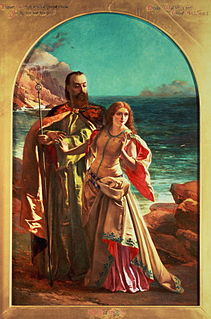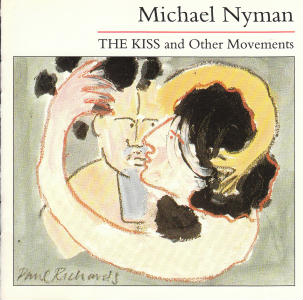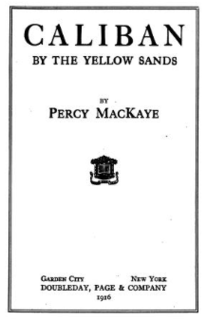Michael Laurence Nyman, CBE is an English composer of minimalist music, pianist, librettist and musicologist, known for numerous film scores, and his multi-platinum soundtrack album to Jane Campion's The Piano. He has written a number of operas, including The Man Who Mistook His Wife for a Hat; Letters, Riddles and Writs; Noises, Sounds & Sweet Airs; Facing Goya; Man and Boy: Dada; Love Counts; and Sparkie: Cage and Beyond. He has written six concerti, five string quartets, and many other chamber works, many for his Michael Nyman Band. He is also a performing pianist. Nyman prefers to write opera over other forms of music.

Prospero is a fictional character and the protagonist of William Shakespeare's play The Tempest. Prospero is the rightful Duke of Milan, whose usurping brother, Antonio, had put him to sea on a "rotten carcass" of a boat to die, twelve years before the play begins. Prospero and Miranda had survived and found exile on a small island. He has learned sorcery from books, and uses it while on the island to protect Miranda and control the other characters.
Caliban, son of the witch Sycorax, is an important character in William Shakespeare's play The Tempest.

Miranda is one of the principal characters of William Shakespeare's The Tempest. She is the only female character to appear on stage.
Prospero's Books is a 1991 British avant-garde film adaptation of William Shakespeare's The Tempest, written and directed by Peter Greenaway. Sir John Gielgud plays Prospero, the protagonist who provides the off-screen narration and the voices to the other story characters. As noted by Peter Conrad in The New York Times on 17 November 1991, Greenaway intended the film “as an homage to the actor and to his "mastery of illusion." Sir John's Prospero is Shakespeare, and having rehearsed the action inside his head, speaking the lines of all the other characters, he concludes the film by sitting down to write The Tempest.”
Job: A Masque for Dancing is a one act ballet produced for the Vic-Wells Ballet in 1931. Regarded as a crucial work in the development of British ballet, Job was the first ballet to be produced by an entirely British creative team. The original concept and libretto for the ballet was proposed by the scholar Geoffrey Keynes, with choreography by Ninette de Valois, music by Ralph Vaughan Williams, orchestrations by Constant Lambert and designs by Gwendolen Raverat. The ballet is based on the Book of Job from the Hebrew Bible and was inspired by the illustrated edition by William Blake, published in 1826. Job had its world premiere on 5 July 1931, and was performed for members of the Camargo Society at the Cambridge Theatre, London. The first public performance of the ballet took place on 22 September 1931 at the Old Vic Theatre.

The Fairy-Queen is a semi-opera by Henry Purcell; a "Restoration spectacular". The libretto is an anonymous adaptation of William Shakespeare's comedy A Midsummer Night's Dream. First performed in 1692, The Fairy-Queen was composed three years before Purcell's death at the age of 35. Following his death, the score was lost and only rediscovered early in the twentieth century.
The Tempest is an opera by English composer Thomas Adès with a libretto in English by Meredith Oakes based on the play The Tempest by William Shakespeare.
The Michael Nyman Band, formerly known as the Campiello Band, is a group formed as a street band for a 1976 production of Carlo Goldoni's 1756 play, Il Campiello directed by Bill Bryden at the Old Vic. The band did not wish to break up after the production ended, so its director, Michael Nyman, began composing music for the group to perform, beginning with "In Re Don Giovanni", written in 1977. Originally made up of old instruments such as rebecs, sackbuts and shawms alongside more modern instruments like the banjo and saxophone to produce as loud a sound as possible without amplification, it later switched to a fully amplified line-up of string quartet, double bass, clarinet, three saxophones, horn, trumpet, bass trombone, bass guitar, and piano. This line up has been variously altered and augmented for some works.
La Traversée de Paris(The Crossing of Paris) is an album by the Michael Nyman Band featuring music composed by Michael Nyman for an audio-visual exhibition of the same name which took place at the Grande Arche de la Défense from July to December 1989 to celebrate the bicentennial of the French Revolution.

The Michael Nyman Songbook is a collection of art songs by Michael Nyman based on texts by Paul Celan, Wolfgang Amadeus Mozart, William Shakespeare and Arthur Rimbaud. It was recorded as an album with Ute Lemper in 1991, and again as a concert film in 1992, under the direction of Volker Schlöndorff, again with Ute Lemper, though many of the musicians had changed. The songs have been recorded by others and as instrumentals, and are published by Chester Music. The album has been issued by both London Records and Argo Records, though the covers are the same except for the logo.

Sycorax is an unseen character in William Shakespeare's play The Tempest (1611). She is a vicious and powerful witch and the mother of Caliban, one of the few native inhabitants of the island on which Prospero, the hero of the play, is stranded.
Tristram Shandy is an unfinished opera project by Michael Nyman based on his favorite novel, The Life and Opinions of Tristram Shandy, Gentleman, by Laurence Sterne, begun in 1981. The project has been perpetually on hold for want of a commission, but at least five excerpts of the opera have been performed publicly, and one has been released on a commercial recording.

The Essential Michael Nyman Band is a studio album featuring a collection of music by Michael Nyman written for the films of Peter Greenaway and newly performed by the Michael Nyman Band. It is the seventeenth album release by Nyman. The album features liner notes by Annette Morreau, who describes the album as "a summation and digest of ten years of progress in the performance of music by a composer -- a composer with whom, so evidently, a group of friends and expert musicians intimately identify their total commitment, virtuosity, and joyous enthusiasm."

The Kiss and Other Movements is the sixth album release by Michael Nyman, and the fifth recording with the Michael Nyman Band. The title track is an "operatic duet" between Dagmar Krause and Omar Ebrahim, based on a painting of the same title by Paul Richards, which is depicted on the cover, and used in a video art project by Richards of the same name. The album includes music from Peter Greenaway's Making a Splash and 26 Bathrooms, an excerpt of Nyman's unfinished opera, Tristram Shandy, and a concert piece, "Tango Between the Lines".

The Piano Concerto/MGV is the 23rd album by Michael Nyman, released in 1994. It contains two compositions, The Piano Concerto and MGV. The first is performed by Kathryn Stott and the Royal Liverpool Philharmonic Orchestra conducted by Michael Nyman, and the second is performed by the Michael Nyman Band and Orchestra with Michael Nyman at the piano.

Ariel is a spirit who appears in William Shakespeare's play The Tempest. Ariel is bound to serve the magician Prospero, who rescued him from the tree in which he was imprisoned by Sycorax, the witch who previously inhabited the island. Prospero greets disobedience with a reminder that he saved Ariel from Sycorax's spell, and with promises to grant Ariel his freedom. Ariel is Prospero's eyes and ears throughout the play, using his magical abilities to cause the tempest in Act One which gives the play its name, and to foil other characters' plots to bring down their master.
Ferdinand is the prince of Naples and the son of Alonso, the King of Naples, in Shakespeare's play, The Tempest. He falls in love with Miranda. He is quick to promise the title of queen and wife to Miranda even though he doesn't know her name. He is happy in humble labours, blinded by love. He makes a solemn vow to be truthful to Prospero, and not to violate Miranda's chastity before their wedding.

The Tempest is a play by English playwright William Shakespeare, probably written in 1610–1611, and thought to be one of the last plays that Shakespeare wrote alone. After the first scene, which takes place on a ship at sea during a tempest, the rest of the story is set on a remote island, where the sorcerer Prospero, a complex and contradictory character, lives with his daughter Miranda, and his two servants: Caliban, a savage monster figure, and Ariel, an airy spirit. The play contains music and songs that evoke the spirit of enchantment on the island. It explores many themes, including magic, betrayal, revenge, and family. In Act IV, a wedding masque serves as a play-within-a-play, and contributes spectacle, allegory, and elevated language.

Caliban by the Yellow Sands is a play by Percy MacKaye, published in 1916.












